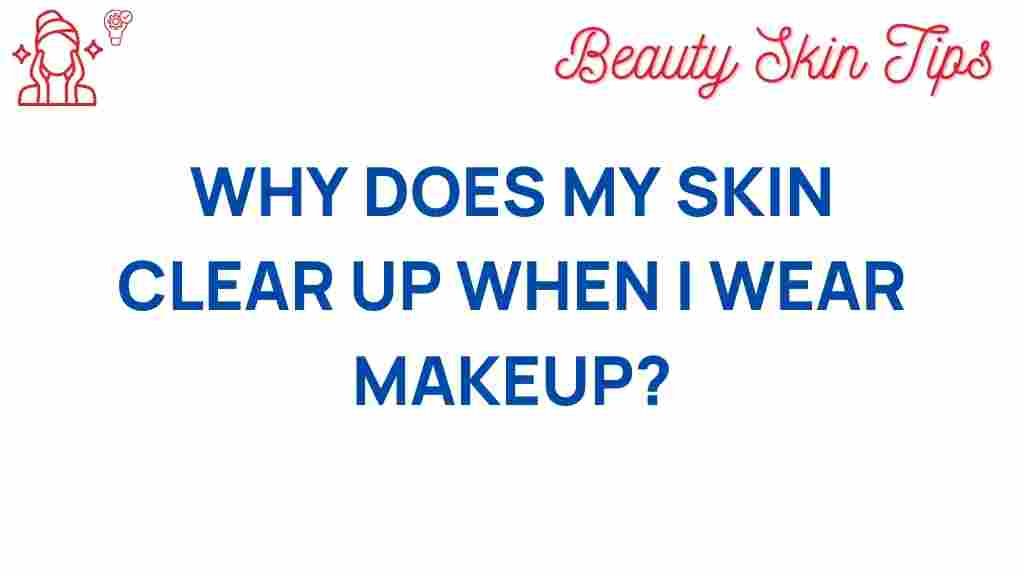The Surprising Truth: Why Makeup Can Clear Up Your Skin
When you think of makeup, your mind might conjure images of glamor, artistry, and self-expression. However, what if we told you that makeup can also play a role in improving your skin’s health? This might sound counterintuitive, especially given the common belief that makeup can clog pores and cause breakouts. In this article, we will explore the surprising truth about how makeup can actually help clear up your skin, debunk myths, and provide you with valuable tips on how to choose the right products.
Understanding the Connection Between Makeup and Skin Health
Makeup has evolved significantly over the years, and many products now contain skin-loving ingredients that can benefit your complexion. Here are several reasons why makeup can contribute to clearer skin:
- Formulations with Skincare Benefits: Many brands now infuse their makeup with ingredients like hyaluronic acid, vitamins, and antioxidants that moisturize and protect the skin.
- Non-Comedogenic Options: Non-comedogenic makeup is specifically designed to avoid clogging pores, making it a great choice for those prone to breakouts.
- Sun Protection: Some makeup products contain SPF, offering an additional layer of protection against harmful UV rays, which can worsen skin issues.
- Coverage for Skin Conditions: Makeup can help cover acne, rosacea, and other skin conditions, boosting confidence while allowing the skin to heal underneath.
Choosing the Right Makeup Products
To harness the benefits of makeup for your skin, it’s crucial to select the right products. Here’s a step-by-step guide to help you choose wisely:
1. Identify Your Skin Type
Understanding your skin type is essential in selecting makeup. Here’s a quick breakdown:
- Oily Skin: Look for oil-free, matte foundations and powders.
- Dry Skin: Choose hydrating formulas with moisturizing ingredients.
- Combination Skin: Opt for products that balance oil and hydration.
- Sensitive Skin: Seek hypoallergenic, fragrance-free options.
2. Look for Non-Comedogenic Labels
Always check for the “non-comedogenic” label on makeup products. This indicates that the product is formulated to not clog pores, helping prevent breakouts.
3. Focus on Ingredients
Read the ingredient list and look for beneficial components:
- Hyaluronic Acid: Helps retain moisture.
- Salicylic Acid: Aids in preventing acne.
- Vitamin E: Acts as an antioxidant.
4. Test Before You Buy
Whenever possible, test makeup on your skin before committing to it. Many stores offer samples or testers, allowing you to see how the product wears throughout the day.
The Application Process
How you apply makeup can also affect your skin’s health. Follow these steps for a clear and radiant finish:
1. Start with a Clean Canvas
Always wash your face with a gentle cleanser to remove dirt and excess oil. This helps your makeup apply smoothly.
2. Use a Primer
A good primer not only helps your makeup last longer but can also provide additional skincare benefits. Choose a primer that suits your skin type:
- Mattifying Primer: For oily skin.
- Hydrating Primer: For dry skin.
- Color-Correcting Primer: To neutralize redness or dullness.
3. Apply Foundation Carefully
Use a makeup sponge or brush to apply foundation evenly. Opt for a lightweight formula that allows your skin to breathe.
4. Incorporate Concealer
Use concealer to cover blemishes or dark circles. Look for formulas that offer good coverage without being too heavy.
5. Choose the Right Setting Products
Set your makeup with a translucent powder or setting spray to keep everything in place without adding extra weight.
Troubleshooting Common Makeup Issues
Even with the best products and application techniques, you may encounter some challenges. Here are common issues and how to resolve them:
1. Makeup Caking or Flaking
This can happen if your skin is not properly prepped. Ensure you are moisturizing your skin adequately before applying makeup. Using a hydrating primer can also help.
2. Breakouts After Makeup Use
If you notice more breakouts, it might be time to evaluate your products. Switch to non-comedogenic options and ensure you’re cleansing thoroughly at night.
3. Oily Skin Throughout the Day
For those with oily skin, keep blotting papers handy to absorb excess oil without disturbing your makeup. Setting sprays with oil control can also be beneficial.
Removing Makeup Properly
How you remove your makeup is just as important as how you apply it. Proper removal helps prevent clogged pores and breakouts:
- Use a Makeup Remover: Consider oil-based removers for heavy makeup and micellar water for lighter looks.
- Double Cleanse: Follow up with a gentle cleanser to ensure all traces of makeup are gone.
- Don’t Forget Your Skin: After cleansing, apply a nourishing moisturizer or treatment to replenish your skin.
Additional Tips for Healthy Skin
Incorporating makeup into your routine can be beneficial, but it’s important to remember that a comprehensive skincare routine is essential for long-term skin health:
- Stay Hydrated: Drink plenty of water to keep your skin hydrated from the inside out.
- Eat a Balanced Diet: Foods rich in antioxidants, vitamins, and minerals can improve skin health.
- Get Enough Sleep: Aim for 7-9 hours of quality sleep for your skin to repair itself.
- Manage Stress: Stress can trigger skin issues, so practice relaxation techniques like yoga or meditation.
Conclusion
Makeup doesn’t have to be the enemy of healthy skin. With the right products and practices, you can use makeup to enhance your natural beauty while also contributing to skin health. Remember to choose non-comedogenic options, pay attention to ingredients, and remove your makeup properly at the end of the day. By understanding the surprising truth about makeup, you can enjoy a glowing complexion and feel confident in your skin.
For more tips on skincare and makeup, check out this comprehensive guide to achieving the perfect look without sacrificing your skin health.
Have any questions or tips of your own? Share them in the comments below!
This article is in the category Skincare and created by BeautySkinTips Team
